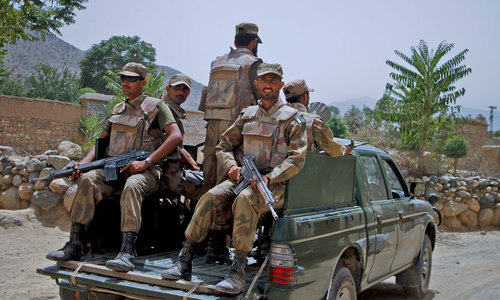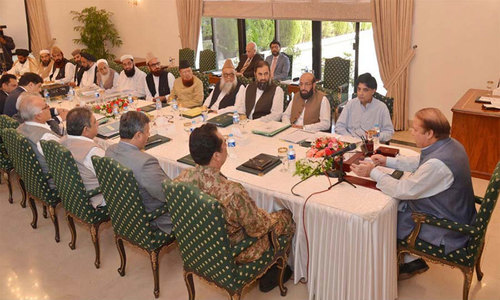ISLAMABAD: Federal Interior Minister Chaudhry Nisar Ali Khan on Wednesday said networks of terrorists had been "broken", however, the elimination of their facilitators would still "take some time".
Addressing the upper house of the parliament, he said that a Joint Intelligence Directorate of the National Counter-Terrorism Authority (Nacta) would be functional very soon and added that it would be a big step forward in the fight against terrorism.
He said for the first time 61 proscribed organisations had been put on record, and that these organisations had also been banned from the media.
The minister said that although the "'situation in Balochistan was not normal", there was a notable improvement in the law and order situation in the province.
Also read: More than 9,000 arrested in Balochistan under NAP in 2015: Durrani
Nisar told members of the Senate that Federally Administered Tribal Areas (Fata) reforms would be carried out in consultations with all the stakeholders, adding that a committee for the reforms, headed by Senator Sartaj Aziz, would present its report to the government in the next few days.
The interior minister further said that International Non-Governmental Organisations (INGOs) were being brought under the ambit of law and their working was being made transparent.
Read more: Over 100 INGOs registered under new rules: Nisar
He said in the first two months, the process of registration of INGOs would be completed afresh, adding that so far 127 INGOs had applied for online registration. Only registered INGOs would be allowed to work in Pakistan, he added.
The minister said under the fourth schedule, more than 8,000 people had been identified and they were being monitored.
At least 115 million Subscriber Identity Modules (Sims) had been registered in the country while 90 million were blocked, he informed parliamentarians.
NAP agenda of Pakistan's integrity, security
Responding to various questions of the Senators, Nisar said that the National Action Plan (NAP) against terrorism was the agenda of Pakistan's integrity and security, adding that "there should be no politics" over it.
He said that as a result of NAP, remarkable improvement had been witnessed in the security situation and for the first time there was a decline in suicide attacks, abductions and attacks on law enforcement agencies.
However, the minister added that "a lot more" had to be done for complete eradication of terrorism from the country.
He said implementation of NAP was a shared responsibility as 10 out of 20 points were regarding provinces, eight related to various ministries and others with the military and the intelligence agencies.
Read more: Implementing NAP is a shared responsibility, govt reiterates
Chaudhry Nisar said there was satisfactory progress on 15 points whereas progress was slow on the remaining five.
"Removing the degeneration of the last 20 to 25 years would take some time," he said.
The interior minister said there were at least 20,000 students in both registered and unregistered seminaries of the federal capital.
In the past, he said, seminaries were established even on green belts but the present government has not allowed construction of any seminary without proper permission.
Read more: Govt won’t spare errant seminaries, ulema told
Nisar turned his attention towards the terrorist networks and said that the dialogue process with Taliban had taken place under a strategy formulated in consultation with military and political leadership.
However, after the failure of dialogue, operation Zarb-i-Azb had been launched against terrorists with consensus of military and civilian leadership.
However, he said that a military operation alone could not rectify the situation and the ministry has formed a policy in this regard.
The minister said that in coordination with the provincial governments, a lot of big acts of terrorism were preempted, adding that during the last one year at least 6,500 intelligence-based operations were conducted.














































